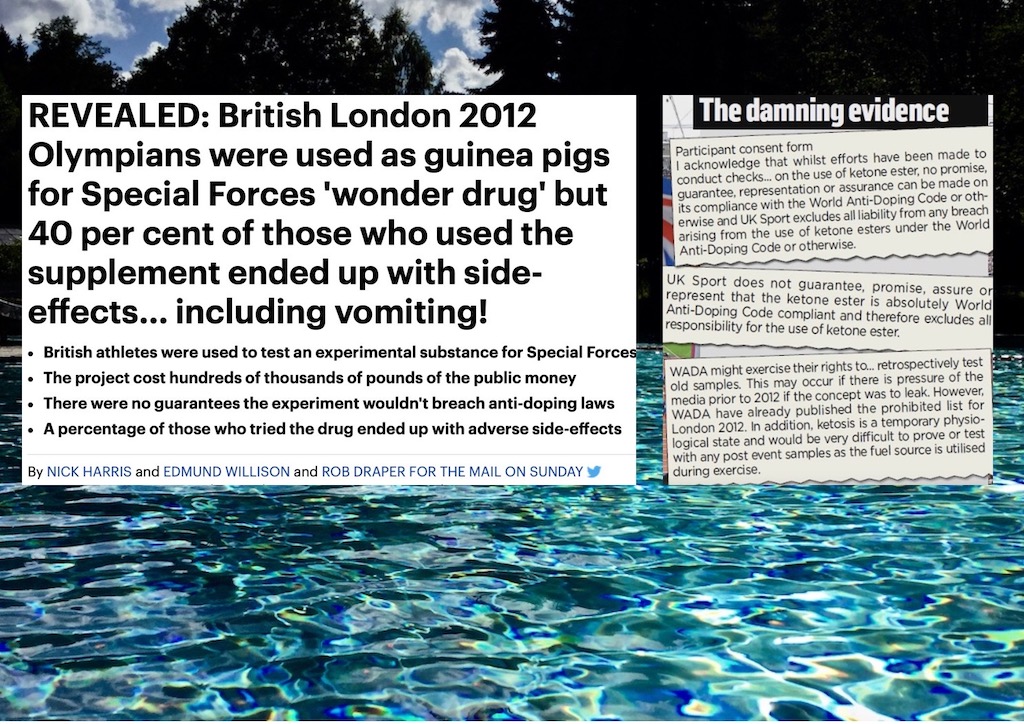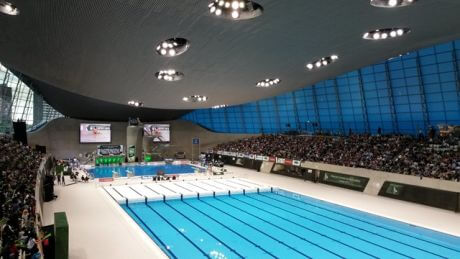British Swimmers Were Part Of Secret ‘Ketone Ester Project’ On Way To London 2012 Olympics

British swimmers were among Olympians used as “guinea pigs” to test an experimental substance “in a secret UK Sport project costing hundreds of thousands of pounds of public money” on the way to the London 2012 Olympic Games, according to an investigation by The Mail on Sunday.
The allegations on a research project said to have been conducted to assist “special forces”, include references to performance gains. While Team GB celebrated its most successful Olympic Games in 2012, the performance of British swimmers in the pool fell significantly shy of expectation, while more than a quarter of the 91 athletes who took part in UK Sport’s Ketone Ester project left the scheme because of side-effects including vomiting and stomach upsets and around a quarter left because they felt the DeltaG drink at the heart of the research program provided no benefit to them.
Something described as “novel nutritional intervention” was fed to medal hopefuls during competition “despite only being available for use in ‘research’, and there being no guarantees it wouldn’t breach anti-doping rules or that it was free of side-effects,” according to Mail on Sunday reporters Nick Harris, Edmund Willison and Rob Draper.
The investigations alleges that UK Sport “prepared waivers freeing themselves of any blame if anything went wrong and non-disclosure agreements banning athletes from talking about it”, citing tranches of documents obtained by The Mail on Sunday showing that 91 elite athletes from eight Olympic sports, including swimming, were given energy-boosting drink DeltaG in the first stage of the product’s in-competition testing in humans.
Some athletes became sick as a result of consuming DeltaG, the Mail states among allegations that stretch to supplementation being handed to athletes without those running the program knowing whether the substances in the drink complied fully with anti-doping rules.
DeltaG contains a synthetic version of ketones, a naturally occurring body acid. The substance was developed by scientists at Oxford University. Later, it was given to athletes as part of what was called “the Ketone Ester project“.
Ketone ester (an ester is a chemical compound derived from an acid in which at least one hydroxyl group is replaced by an alkoxy group) was commercially available from 2018, seven years after UK Sport’s funded research project into the substance. In October that year Michael Brandt and Dr. Brianna Stubbs published the following article on Ketone use in sport on the HVMN website where its own Ketone products are advertised.
The HVMN article includes:
“D-BHB is a powerful anti-oxidant and anti-inflammatory molecule, so taking exogenous ketones could help to reduce the strain of exercise on the body and speed recovery.8 As this is an area of active investigation, stay tuned for future research into the effects of exogenous ketones on recovery.”
In a statement, UK Sport said: “The Ketone Ester project received independent ethical approval from the Research Advisory Group in January 2012. Additionally, UK Anti-Doping (UKAD) confirmed in writing, after seeking clarification from the World Anti-Doping Agency, (WADA), that WADA had no reason to consider such substances as banned under the 2011 List of Prohibited Substances and Methods.
“From the outset, this study stated it complies, and at all times will comply, with the Declaration of Helsinki developed by the World Medical Association as a statement of ethical principles to provide guidance to physicians and other participants in medical research to promote and safeguard the health of the people involved.”
The UK Sport statement also noted:
“Any research project funded by UK Sport investment includes a participant consent form to ensure it operates with full transparency with regards to any risks to participants, and also for the purpose of full disclosure.
“Participating athletes agree they have been provided with full details of the study and have had the opportunity to raise and discuss questions with a named researcher.
“Athletes are not put under pressure from UK Sport to take part in any research project or to provide their consent, and may withdraw at any time.
“UK Sport is fully committed to developing a high performance culture that is truly inspirational and one that will set us apart from our global competitors – but UK Sport will never seek to win medals at any cost.”
Project On Way To London 2012 “At Own Risk”

The London Aquatics Centre – Photo Courtesy: Craig Lord
The Mail on Sunday reports that athletes were made to sign documents saying that DeltaG was taken at their own risk, noting:
“It declares that the well-being of the human subject should take precedence over the interests of science and society.”
While Ketone supplements do not feature on the prohibited substances and methods list of WADA, the global anti-doping watchdog emphasises in its educational material and in quotes to be found far and wide in the archive of media reports and press releases that extreme caution is advised in all supplementation, the risk off cross-contamination obvious from the large number of positive tests returned by athletes who were unaware that product A contained banned substance B without B being listed among ingredients.
The team at the Mail found that more than 40 per cent of athletes who were part of the DeltaG project suffered side effects, including vomiting and stomach upsets. The paper notes that 28 athletes left the project as a result of the side effects.
It is not known at what stage athletes opted out of the project but a further 24 withdrew their cooperation because they believed DeltaG gave them no benefit in their athletic preparation.
According to the Mail investigation, UK Sport had a communications strategy ready in case the project was leaked to the media ahead of the London 2012 Olympics, the first home Games for 104 years. The concern was that the project might lead to “negative perceptions and publicity” in relation to an “unfair competitive edge.”
A confidential 14-page “road map” cited by the Mail states: “The UK Sport aim is to implement the use of DeltaG with targeted athletes and sports in the period leading into and during London 2012 with events greater than five minutes’ duration and multi-event athletes.
“These sports include cycling, hockey, sailing, athletics, swimming, modern pentathlon and select others.”
It is not clear how the athletes , nor sports, were selected for the project.
UK Sport tells athletes in the document:
“WADA might exercise … their rights to regulate … [and] collect blood samples or retrospectively test old samples. This may occur if there were pressure of the media if the concept was to leak. However … ketosis is a temporary physiological state and would be difficult to prove or test with any post-event samples.”
The Mail reports:
“This 14-page document detailed how UK Sport’s Research & Innovation team first noticed an article in a 2007 scientific journal about DeltaG, then being developed by the US military and being tested in animals ‘for physical and cognitive endurance performance’.
“UK Sport contacted the US military, who in turn pointed UK Sport to Oxford University, whom UK Sport paid to conduct trials of the substance in rowers and cyclists. Invoices show UK Sport paid Oxford’s research team £4,000 in early 2011, for a trial involving rugby players at Bath University; and then £183,600 later in 2011 for the trials on the rowers and cyclists; and then £42,115 in early 2013 as a further ‘research grant’ for DeltaG studies on sportspeople.”
Success For Some, Not For Others
While London 2012 was Britain’s most successful Olympic Games ever on medals count – at 29 gold, 17 silver and 19 bronze – swimming had a hard time: Michael Jamieson produced the top result in the pool for the hosts, with silver in the 200m breaststroke, while Rebecca Adlington was the only other medallist, backing up double gold over 400m and 800m freestyle at Beijing 2008 with bronze medals in the same events.
Advertising: Shop At Swim360




Jan Aldwin Baldovino
The fu-? Oh HELL nah!
Now the medals are suspect! Oh… someone’s @.$$ is gonna be on the block over this one.
Not the swimming medals… there were just three 🙂 all legit; overall swim team result below form guide. And not over a banned substance, either. The issues are serious, bizarre and, as you suggest, do call into question the decisions of any of those involved in deciding this was something athlete ought to be asked to be involved in…